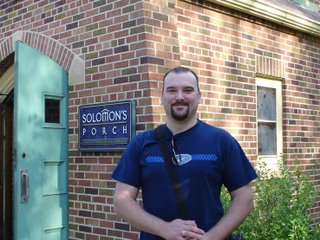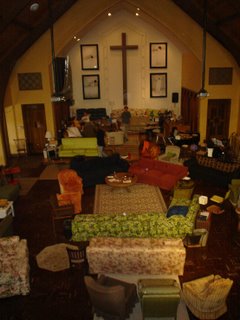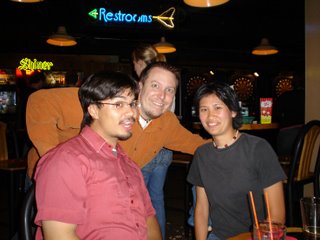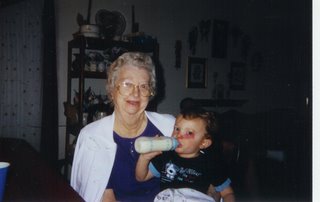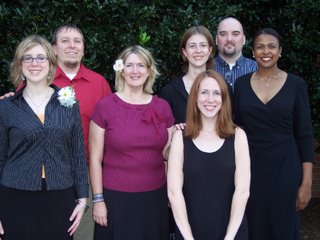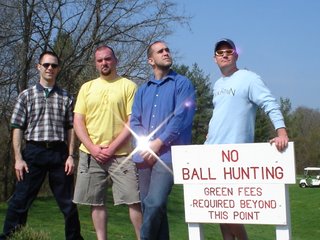My best friend and I really connect and think alike most of the time. So when we start going down different thought paths, especially as it pertains to spiritual things, it is very frustrating and hurts a bit. I think there are many contributing factors. One is that if there is difference, we feel that the other person must just be misunderstanding, or is missing an important factor that the other has not considered, and so we try to clear that up and the result is even more frustrating when we still don't agree. Or seemingly don't agree. It makes us feel like we have failed in communicating our thoughts, because surely if they understood, we would agree.
But a recent conversation has brought out another issue. We have been discussing where "we" as individuals and where "we" as a former house church go from here, in terms of "church." The two of us had some incredible time of sharing, envisioning, and praying last night with a couple of our friends. On the way home, we started talking about what this all meant; what did we want to share with the group about our individual journeys. As we shared how we would like to get from where we are spiritually now, to where we want to be, we realized that there appeared to be a significant difference.
I'm still trying to analyze and characterize the differences, but I think that one of the major underlying difference lies in our understanding of division/unity. I really saw this at the Global Night Commute. That night, there was a large group of people singing songs to God. It was awesome. Except it was mostly songs that I/we (the group I came with) didn't know. I enjoyed it, and when I could, I participated. The group I came with (6 people) for the most part were busy during that time writing letters to Congressman. Anyway, I know that a couple wanted to sing some songs that we have memorized... some of them four part harmony. So, after the other group was done singing for awhile, I mentioned to my friend that we could do our singing now. He said he would have no part of it. "Why?" I asked. He felt that it would be divisive. He felt that if the whole group wasn't doing it, then if we did our own thing, we would be clique-ish, and divisive. I didn't agree with him then, nor do I agree with him now. But we didn't sing that night.
You see, I see division differently than he does. This is how I viewed the whole thing. So, there is a large group singing songs that we didn't really know. You can't really participate in that, so many just stayed on the side, writing letters and listening. (Was the large group being divisive, because they were singing songs that some of us didn't know and didn't feel comfortable participating in?) Later, after the group had pretty much disbanded, I suggested that our group sing praises to God.. the ones that we know and can participate in. We would not be "competing" with the other group... they were done. We would not be exclusive, because we would have loved anyone to join us (that's how the first group got started singing anyway). Was singing songs that many people didn't know being "divisive?" I don't think so.
Being a leader means that sometimes you will be doing things that are different. Some may know what's going on, some won't. But in doing so, you can start something that brings the whole group together. But someone has to start doing something somewhere. For example, if we were to join another church, or start one, I would want the practice of the Blessing to be a part of that spiritual community. Now, if the others in that community have never participated in a blessing, and don't see the benefit, and don't initially see the value and so don't participate, and yet I gather those in the community who do see the value, and we continue the praxis of the Blessing, then am I being divisive? Exclusive? I hope not. I don't think so. In fact, it is the only way to begin to share the wonderful blessings of the Blessing tradition... by having a group that continues on, providing a way of showing people what it is (see the previous entry from today).
The practice of the Blessing is now part of my spiritual heritage that I want to continue, and pass on to my kids... even if the rest of my "church" doesn't value or participate. The same could be said of memorization and singing of 2-4 part a cappella songs. I enjoy that style of worship. I also value the training it gives in learning to read music, and helping foster the ability to hear and sing harmonies. But most important to me, is that it allows for robust, powerful, and spontaneous praise and worship anywhere, anytime. I don't want me or my family to be so dependent on instruments that we can't start praising God anywhere without instruments. I think that a cappella music (which, by the way, comes from the Italian meaning, "in the manner of church or the chapel" and is an ancient Christian practice) is something wonderful that adds depth to the many other spirtual practices that the church can participate in.
So, let's say that I join a community of 100 Christians. And let's say that someone feels most connected to God when they fast for a whole day, once a week. This person gains incredible spiritual strength and power when doing so. So, this person shares this practice with several others. 15 people try it; but only 6 get anything from it. So, these six decide to meet every Thursday night, after a day of fasting, and share, sing, and pray. They decide to actually function as a small group on Thursdays. Since most small groups in this hypothetical church involve sharing food, and this group gets power from not eating, they might be a little different. But they invite people to their small group, and share, as they always do, what power and insight they have gained from fasting that day. Sure, some, if not most, visitors might feel uncomfortable, but some might see the group's witness and start that practice too. The group all goes to the main Sunday gathering; some participate in the creative team, others participate in the several service projects that the church does. In this scenario, is this group being divisive? Or creating and valuing a spiritual heritage?
Like all things taken to extreme, creating and valuing a spiritual heritage can be divisive. But that should not keep us from redeeming those special, unique practices. (Another example might be a group of people from a Catholic background, that get together and in a way that focuses entirely on God, uses the Rosary to have group prayer time.) Holding on to a heritage doesn't necessarily equate to division. In fact, in today's world, multiculturalism is the guiding principle in America. It is the idea that multiple cultural traditions and ideas can be valued and appreciated, and shared among all, without losing the uniqueness of that culture.
Hopefully, my best friend and I can realize that the differences we have are only apprearances. As I have written this, I have become more convinced of that. Because we are ultimately going in the same direction, and want the same core thing: to be a contributing part of a missional community of God on earth. May God empower us to be so.

 Here is the other side of the sunroom, which I use as a dining room. The four paintings on the back wall were down by a good friend and member of our house church, Dana H. As a house church, we asked her to do paintings that convey the four principles we were stressing at the time; Embrace, Challenge, Give, and Enjoy. She did an incredible job.
Here is the other side of the sunroom, which I use as a dining room. The four paintings on the back wall were down by a good friend and member of our house church, Dana H. As a house church, we asked her to do paintings that convey the four principles we were stressing at the time; Embrace, Challenge, Give, and Enjoy. She did an incredible job. And the family room. We often joked that our house church was the "Church of the Purple Couch." (It's a long story as to why I have a purple couch, but I like it a lot!)
And the family room. We often joked that our house church was the "Church of the Purple Couch." (It's a long story as to why I have a purple couch, but I like it a lot!)

